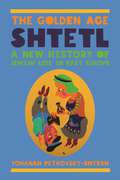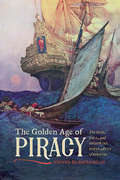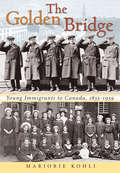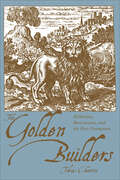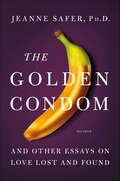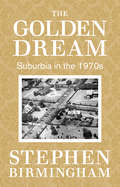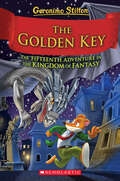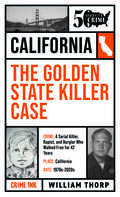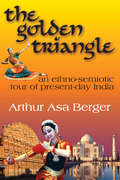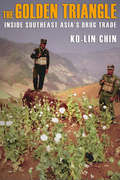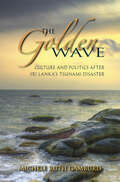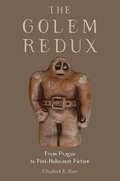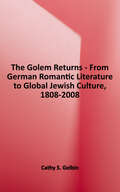- Table View
- List View
The Gold of Exodus: The Discovery of the True Mount Sinai
by Howard BlumMount Sinai. For many, it is the most sacred place on Earth-the site where God descended to give Moses the Ten Commandments. Yet for centuries, mankind has not known its exact location. In this heart-pounding true story, award-winning journalist and bestselling author Howard Blum tells the enthralling account of two modern-day adventurers-Larry Williams, a two-time Republican candidate for the U.S. Senate from Montana and a self-made millionaire, and his friend Bob Cornuke, a retired policemen and former SWAT team member. Lured by the prospect of finding the fabled fortune in gold that the ancient Hebrews took with them when they fled from Egypt, the two men set out to find the true site of Mount Sinai-with only the Old Testament as a guide. Eminent biblical scholars at Harvard and the University of Pennsylvania have argued that Mount Sinai is not in the Sinai Peninsula at all, but rather in northwestern Saudi Arabia. However, they were never allowed into the kingdom to prove their argument. When Cornuke and Williams are also denied entry, they daringly sneak into Saudi Arabia. And what they discover at the mountain known as Jabal al Lawz will astonish the world-and inspire readers to rethink the role of the Bible in history. They find the remains of the stone altar at which the Golden Calf was worshiped, the twelve pillars that Moses ordered to be erected, the cave where Moses slept, and, most sensationally, the unnaturally scorched spot on the mountaintop where God gave Moses the two stone tablets. They also explain, in a fascinating account, the truth about the parting of the Red Sea waters. And not the least of their discoveries is the fact that one of the most sacred spots on earth is now a top secret Saudi military base. As these two adventurers follow in Moses' footsteps, they become pawns in a dangerous game of international power politics and intrigue, This action-packed tale-part high-tech treasure hunt, part modern-day spy thriller, and part biblical detective story-is riveting. And it is all true.
The Golden Age Musicals of Darryl F. Zanuck: The Gentleman Preferred Blondes
by Bernard F. DickBeginning with The Jazz Singer (1927) and 42nd Street (1933), legendary Hollywood film producer Darryl F. Zanuck (1902–1979) revolutionized the movie musical, cementing its place in American popular culture. Zanuck, who got his start writing stories and scripts in the silent film era, worked his way to becoming a top production executive at Warner Bros. in the later 1920s and early 1930s. Leaving that studio in 1933, he and industry executive Joseph Schenck formed Twentieth Century Pictures, an independent Hollywood motion picture production company. In 1935, Zanuck merged his Twentieth Century Pictures with the ailing Fox Film Corporation, resulting in the combined Twentieth Century-Fox, which instantly became a new major Hollywood film entity.The Golden Age Musicals of Darryl F. Zanuck: The Gentleman Preferred Blondes is the first book devoted to the musicals that Zanuck produced at these three studios. The volume spotlights how he placed his personal imprint on the genre and how—especially at Twentieth Century-Fox—he nurtured and showcased several blonde female stars who headlined the studio’s musicals—including Shirley Temple, Alice Faye, Betty Grable, Vivian Blaine, June Haver, Marilyn Monroe, and Sheree North. Building upon Bernard F. Dick’s previous work in That Was Entertainment: The Golden Age of the MGM Musical, this volume illustrates the richness of the American movie musical, tracing how these song-and-dance films fit within the career of Darryl F. Zanuck and within the timeline of Hollywood history.
The Golden Age Shtetl: A New History of Jewish Life in East Europe
by Yohanan Petrovsky-ShternA major history of the shtetl's golden ageThe shtetl was home to two-thirds of East Europe's Jews in the eighteenth and nineteenth centuries, yet it has long been one of the most neglected and misunderstood chapters of the Jewish experience. This book provides the first grassroots social, economic, and cultural history of the shtetl. Challenging popular misconceptions of the shtetl as an isolated, ramshackle Jewish village stricken by poverty and pogroms, Yohanan Petrovsky-Shtern argues that, in its heyday from the 1790s to the 1840s, the shtetl was a thriving Jewish community as vibrant as any in Europe.Petrovsky-Shtern brings this golden age to life, looking at dozens of shtetls and drawing on a wealth of never-before-used archival material. Illustrated throughout with rare archival photographs and artwork, this nuanced history casts the shtetl in an altogether new light, revealing how its golden age continues to shape the collective memory of the Jewish people today.
The Golden Age of Piracy: The Rise, Fall, and Enduring Popularity of Pirates
by David HeadTwelve authors shed new light on the true history and enduring mythology of seventeenth– and eighteenth–century pirates in this anthology of scholarly essays. The twelve entries in The Golden Age of Piracy discuss why pirates thrived in the seas of the New World, how pirates operated their plundering ventures, how governments battled piracy, and when and why piracy declined. Separating Hollywood myth from historical fact, these essays bring the real pirates of the Caribbean to life with a level of rigor and insight rarely applied to the subject. The Golden Age of Piracy also delves into the enduring status of pirates as pop culture icons. Audiences have devoured stories about cutthroats such as Blackbeard and Henry Morgan since before Robert Louis Stevenson wrote Treasure Island. By looking at the ideas of gender and sexuality surrounding pirate stories, the renewed interest in hunting for pirate treasure, and the construction of pirate myths, the contributing authors tell a new story about the dangerous men, and a few dangerous women, who terrorized the high seas. Contributors: Douglas R. Burgess, Guy Chet, John A. Coakley, Carolyn Eastman, Adam Jortner, Peter T. Leeson, Margarette Lincoln, Virginia W. Lunsford, Kevin P. McDonald, Carla Gardina Pestana, Matthew Taylor Raffety, and David Wilson.
The Golden Age of Science Fiction: A Journey into Space with 1950s Radio, TV, Films, Comics and Books
by John WadeA detailed look at the British world of science fiction in the 1950s. John Wade grew up in the 1950s, a decade that has since been dubbed the &“golden age of science fiction.&” It was a wonderful decade for the genre, but not so great for young fans. With early television broadcasts being advertised for the first time as &“unsuitable for children&” and the inescapable barrier of the &“X&” certificate in the cinema barring anyone under the age of sixteen, the author had only the radio to fall back on—and that turned out to be more fertile for the budding SF fan than might otherwise have been thought. Which is probably why, as he grew older, rediscovering those old TV broadcasts and films that had been out of bounds when he was a kid took on a lure that soon became an obsession. For him, the super-accuracy and amazing technical quality of today&’s science fiction films pale into insignificance beside the radio, early TV and B-picture films about people who built rockets in their back gardens and flew them to lost planets, or tales of aliens who wanted to take over, if not our entire world, then at least our bodies. This book is a personal account of John Wade&’s fascination with the genre across all the entertainment media in which it appeared—the sort of stuff he reveled in as a young boy—and still enjoys today. &“Not only a well–researched book grounded in hundreds of sources, but also an unmistakable labor of love.&” —New York Journal of Books
The Golden Bough (Penguin Modern Classics)
by Sir James FrazerSir James George Frazer (1854-1941) caught the popular imagination with his vast and enterprising comparative study of the beliefs and institutions of mankind, which in its third edition numbered 12 volumes. Reissued here is Frazer's own single-volume abridgement of 1922.
The Golden Bough: A Study In Comparative Religion, Volume 2...
by James FrazerA certain sacred tree was forbidden to the touch, save only for runaway slaves: if the slave could break off a branch — The Golden Bough — he could challenge the tree's attendant priest to mortal combat. If victorious, the slave would replace the priest as King of the Woods — until his lethal defeat by another bearer of The Golden Bough. Sir James George Frazer, an expert in myth and religion, was so intrigued by this tale from classical mythology that he spent more than a quarter-century investigating its genesis. His 1890 study of the cults, rites, and myths of antiquity, The Golden Bough, offers a monumental exploration of these customs and their parallels with early Christianity. A pioneer of social anthropology, Frazer's definitions of such terms as "magic," "religion," and "science" proved highly useful to his successors in the field, and his explications of the ancient legends profoundly influenced generations of prominent psychologists, writers, and poets. This abridgment of his multivolume magnum opus omits footnotes and occasionally condenses text; nevertheless, as the author himself observed, all of the original work's main principles remain intact, along with ample illustrative examples.
The Golden Boy
by Robert HatchThis is the first autobiography to be published by The Haworth Press.This is the first autobiography to be published by Harrington Park Press.The place is New York City. The time is the decade before the plague of AIDS. Thousands of gay men were living a free-wheeling lifestyle of club hopping, “score” hunting, sex without fear, and upward mobility. To none did The Big Apple offer greater rewards than to those young men who had the envied “male model” look.Author James Melson belonged to this exclusive clique: he was tall, blond, muscular, and very “straight looking.” He was a model at 19, and by 25, was a highly successful Wall Street banker. His good looks offered him immediate entry into exclusive clubs and onto the sexual fast track with actors, male models, and other members of the “Clique.”The author brings you behind the scenes into the lifestyle of the handsome “Clique”--providing details of the vigorous and entertaining excitement of the times. He exposes--for one of the few times in print--the lesser-known attitudes of the “Clique” and their disdain for “ugly faggots,” their obsession with strictly the chic and glamorous, and the fast lane life of partying and sex.For 200 pages, the reader is brought back to the era that for many older readers is just a memory, and for younger readers a time they never knew--when to be a “Golden Boy” was to be a prince, and sex was only fun and games.The Golden Boy autobiography ends when the author is diagnosed with AIDS, abandoned by a lover and friends, and left to look back on his life with a growing perspective.The role of “good looks” and people with AIDS is rarely talked about, particularly by gay survivors whose lesser appeal was once perhaps a curse but then ultimately their saving grace. This is not just another AIDS autobiography but a document dealing indirectly with this fact of life. The autobiography is introduced by Larry Mass, MD, an internationally recognized social historian/physician who examines the “Culture of Narcissism” in that era. Arnie Kantrowitz then presents an astonishingly frank and perhaps shocking Epilogue which will have many readers wanting to re-read the book.
The Golden Bridge: Young Immigrants to Canada, 1833-1939
by Marjorie Kohli J.A. David Lorente"To thousands of young people, emigration has been the golden bridge by which they have passed from an apparently hopeless childhood to lives of useful service and assured comfort, in this new land." - Mr. G. Bogue Smart, Inspector of British Immigrant Children and Receiving Homes, 1915 Many thousands of Canadians are descended from young immigrants transported to Canada from 1833 to 1939. Author Marjorie Kohli has meticulously documented the incredible story of the removal of thousands of "waifs and strays" and young men and women, primarily from the UK and Ireland. They braved the perilous voyage to an unknown future in Canada, ultimately being placed throughout the Maritimes, Ontario, Quebec and westward as far as British Columbia. The most comprehensive resource of its kind, The Golden Bridge promises to be an indispensable tool for family researchers with a "home child" ancestor, and of interest to those unfamiliar with this aspect of Canadian history. This extensively researched book incorporates background detail on agencies and key organizers such as Maria Rye, Annie Macpherson, Thomas Barnardo and William Quarrier, along with lesser knowns including Ellinor Close and Charles Young. Marjorie Kohli is well known for her years of active involvement with juvenile and child migration issues. Supported by charts, passenger lists and archival visuals, The Golden Bridge is a must-read for genealogists and history buffs alike.
The Golden Builders: Alchemists, Rosicrucians, and the First Freemasons
by Tobias ChurtonA leading scholar of esoteric spirituality uncovers the history of Gnostic alchemy from Hellenistic Alexandria to the Renaissance. In The Golden Builders, Tobias Churton eschews myth and pseudohistory to trace 1,600 years of Hermetic spiritual and philosophical development. In a breathtaking span of detailed research, he sheds light on the origins of Gnostic alchemy, pre-Grand Lodge Freemasonry, and the mysterious Fraternity of the Rosy Cross (the Rosicrucians). He introduces readers to great men of magic and spiritual wisdom such as Paracelsus, Caspar Schwenckfeld, Johann Valentin Andrae, and others. This sweeping work is divided into three parts: Part 1 presents a broad survey of the Hermetic current and its transmissions from Hellenistic Alexandria to the time of Paracelsus. Part 2 focuses on the Rosicrucian movement as a vehicle of the Hermetic current, drawing on the research of scholars such as Carlos Gilly. Part 3 concentrates on Elias Ashmole, the English polymath, alchemist, astrologer, and early Freemason who carried the Hermetic current forward during the Renaissance.Debunking myths while revealing genuine mysteries, The Golden Builders combines authoritative scholarship with deep spiritual wisdom.
The Golden Condom: And Other Essays on Love Lost and Found
by Jeanne SaferDr. Jeanne Safer has dedicated much of her decades' long career in psychotherapy to exploring taboo subjects that we all think about in private but seldom discuss in public. From conflicted sibling relationships to the choice not to have children, Safer's work has always been unflinching in its aim to dive deep into topics that make most of us blush, but which are present in all of our lives. In The Golden Condom, Safer turns her sharp and fearless eye to a subject perhaps more universal than any other-love in all its permutations. In The Golden Condom Safer interweaves her own experiences with those of a variety of memorable people, including her patients, telling a series of tales that investigate relationships--both healthy and toxic--that most of us don't escape life without experiencing at least once, including traumatic friendships, love after loss, unrequited or obsessional love and more. Never prescriptive and always entertaining, these stories will demolish any suspicion you might have that you're alone in navigating a turbulent romantic life, and will inspire you with the range of possibilities that exist to find love, however unconventional, and at any age.
The Golden Dream: Suburbia in the 1970s
by Stephen BirminghamCharming, gossipy and endlessly entertaining, The Golden Dream is a critical glimpse inside 1970s America's most exclusive suburbs.
The Golden Dream: Suburbia in the 1970s
by Stephen BirminghamThe #1 New York Times–bestselling author of Our Crowd offers an anecdote-filled tour of the most exclusive suburbs of 1970s America. In this charming and insightful inquiry, Stephen Birmingham investigates the nesting habits, enjoyments, and frustrations of American suburban life in the seventies. He explores the social organism that is the American suburb—from Scottsdale, Arizona, to New York&’s Westchester County, along with the tawny suburbs surrounding the mighty industrial cities that fringe the Great Lakes. Birmingham spoke with householders great and small, gleaning their private views of the suburban experience. Almost all of them arrived in the suburbs with a dream. The reality they found was often less than they envisioned. Along with swimming pools and manicured lawns come soaring property taxes, status contests, and old-world prejudices colliding with new neighbors. &“Gossipy, chatty [Stephen Birmingham] thrusts his line into the waters of suburban social life, catching a lot of trivia about country clubs and trends.&” —The Christian Science Monitor
The Golden Fleece and the Heroes Who Lived Before Achilles
by Padraic ColumEnter a world where harpies torment mortals, the Argonaut Orpheus sings, the mighty god Zeus wages war on the Titans, and Prometheus steals fire. <P><P> Author Padraic Colum weaves the tales of Jason and his Argonauts with classic Greek mythology to create this captivating epic about life, war, and astounding beings who lived in a time long past. Poetically written and wonderful for reading aloud, this collection of ancient stories will captivate modern readers.<P> Newbery Honor book
The Golden Key (Geronimo Stilton and the Kingdom of Fantasy)
by Geronimo StiltonGeronimo’s fifteenth adventure in the Kingdom of Fantasy!I, Geronimo Stilton, had been called to the Kingdom of Fantasy many times before.I’d visited the magical lands to ride dragons, meet fairies, and defeat evil witches. But not this time!This time, the Kingdom of Fantasy came to New Mouse City. Could I help Queen Imaginaria and put everyone back where they belong?
The Golden Rhinoceros: Histories of the African Middle Ages
by François-Xavier FauvelleA leading historian reconstructs the forgotten history of medieval AfricaFrom the birth of Islam in the seventh century to the voyages of European exploration in the fifteenth, Africa was at the center of a vibrant exchange of goods and ideas. It was an African golden age in which places like Ghana, Nubia, and Zimbabwe became the crossroads of civilizations, and where African royals, thinkers, and artists played celebrated roles in the globalized world of the Middle Ages. The Golden Rhinoceros brings this unsung era marvelously to life, taking readers from the Sahara and the Nile River Valley to the Ethiopian highlands and southern Africa.Drawing on fragmented written sources as well as his many years of experience as an archaeologist, François-Xavier Fauvelle painstakingly reconstructs an African past that is too often denied its place in history—but no longer. He looks at ruined cities found in the mangrove, exquisite pieces of art, rare artifacts like the golden rhinoceros of Mapungubwe, ancient maps, and accounts left by geographers and travelers—remarkable discoveries that shed critical light on political and architectural achievements, trade, religious beliefs, diplomatic episodes, and individual lives.A book that finally recognizes Africa’s important role in the Middle Ages, The Golden Rhinoceros also provides a window into the historian’s craft. Fauvelle carefully pieces together the written and archaeological evidence to tell an unforgettable story that is at once sensitive to Africa’s rich social diversity and alert to the trajectories that connected Africa with the wider Muslim and Christian worlds.
The Golden Road: Notes on my Gentrification
by Caille MillnerThe story of a remarkable young woman's struggle to find a home in the world, a place where she can define herself on her own terms, and live a life that matters.
The Golden State Killer Case (50 States of Crime)
by William ThorpCalifornia. 13 murders, 50 assaults, 42 years of investigation. In 2018, police announced that they had finally arrested the “Golden State Killer,” a man responsible for over 140 burglaries, 50 rapes and at least 13 murders committed in California throughout the 1970s and ’80s. That man turned out to be a former California police officer, Joseph James DeAngelo Jr. Just two months earlier, the publication of I’ll Be Gone in the Dark by Michelle McNamara had rocked the world of true crime. Published two years after her death, the book charts McNamara’s obsessive search for the prolific criminal who had been known over the years as the East Area Rapist, the Original Night Stalker, and the Visalia Ransacker, among other epithets. McNamara is credited with coining the “Golden State Killer” moniker and heightening public awareness of the—at the time—still unsolved case. William Thorp dives into the investigation, exploring the dark side of sunny California, the advances in forensic innovation that made solving this case possible, and the story inside the story—one of an amateur sleuth who dedicated the last years of her life to understanding how one of the country’s worst criminals could have spent so many decades undetected. 50 States of Crime: France’s leading true crime journalists investigate America’s most notorious cases, one for every state in the Union, offering up fresh perspectives on famously storied crimes and reflecting, in the process, a dark national legacy that leads from coast to coast.
The Golden Triangle: An Ethno-semiotic Tour of Present-day India
by Arthur Asa BergerThis book offers a semiotically informed ethnographic study of contemporary culture in Rajasthan and India. It adapts the methodology of analyzing cultures found in Roland Barthes' semiotic portrait of Japanese culture, "Empire of Signs", but adds an analysis of lifestyles as explicated in the work of social anthropologist Mary Douglas, political scientist Aaron Wildavsky, and a number of other social scientists. This manuscript is, at first, a guide to Rajasthan and India, and it is that but it is also more in that it considers tourism from both an anthropological and sociological level.Berger begins with statistics on tourism and other aspects of life in Rajasthan and India, and then considers how tourism in India compares with tourism in other important tourism destinations. He refers to the "Imaginary India" as the picture created in tourists' minds with the help of guidebooks, media, and the Internet before they actually travel to India. He then discusses these representations and how they are actually different from the country itself. The trip itself then becomes the search for the authentic India - the goal is to find places before they are discovered. He calls this "Semiotic Rajasthan," where the representations are compared to actuality.After offering a discussion of semiotic theory, it interprets and analyzes a number of important aspects of Rajasthani and Indian culture such as: the Taj Mahal, the Palace of Winds in Jaipur, the notorious rat temple in Deshnok, and sacred cows. Lastly, he discusses his own trip and how the impact of Rajasthan did not fully register until he returned home.This manuscript's strength lies in the author's ability to write in an accessible manner, assemble the project in an interesting way, and include only that information which will guide the reader along the narrative trail. While this manuscript really is a guidebook to Rajasthan, it could also serve as a good introduction to ethnography for beginning students and an interested general audience. It moves from basic explanations, such as that of semiotics, to complex applications all with the grace of good story telling.
The Golden Triangle: Inside Southeast Asia's Drug Trade
by Ko-Lin ChinThe Golden Triangle region that joins Burma, Thailand, and Laos is one of the global centers of opiate and methamphetamine production. Opportunistic Chinese businessmen and leaders of various armed groups are largely responsible for the manufacture of these drugs. The region is defined by the apparently conflicting parallel strands of criminality and efforts at state building, a tension embodied by a group of individuals who are simultaneously local political leaders, drug entrepreneurs, and members of heavily armed militias. Ko-lin Chin, a Chinese American criminologist who was born and raised in Burma, conducted five hundred face-to-face interviews with poppy growers, drug dealers, drug users, armed group leaders, law-enforcement authorities, and other key informants in Burma, Thailand, and China. The Golden Triangle provides a lively portrait of a region in constant transition, a place where political development is intimately linked to the vagaries of the global market in illicit drugs. Chin explains the nature of opium growing, heroin and methamphetamine production, drug sales, and drug use. He also shows how government officials who live in these areas view themselves not as drug kingpins, but as people who are carrying the responsibility for local economic development on their shoulders.
The Golden Wave: Culture and Politics after Sri Lanka's Tsunami Disaster
by Michele Ruth GamburdIn December 2004 the Indian Ocean tsunami devastated coastal regions of Sri Lanka. Six months later, Michele Ruth Gamburd returned to the village where she had been conducting research for many years and began collecting residents' stories of the disaster and its aftermath: the chaos and loss of the flood itself; the sense of community and leveling of social distinctions as people worked together to recover and regroup; and the local and national politics of foreign aid as the country began to rebuild. In The Golden Wave, Gamburd describes how the catastrophe changed social identities, economic dynamics, and political structures.
The Golden and Ghoulish Age of the Gibbet in Britain (Palgrave Historical Studies in the Criminal Corpse and its Afterlife)
by Sarah TarlowThis book is open access under a CC BY 4.0 licence. This book is the first academic study of the post-mortem practice of gibbeting (‘hanging in chains’), since the nineteenth century. Gibbeting involved placing the executed body of a malefactor in an iron cage and suspending it from a tall post. A body might remain in the gibbet for many decades, while it gradually fell to pieces. Hanging in chains was a very different sort of post-mortem punishment from anatomical dissection, although the two were equal alternatives in the eyes of the law. Where dissection obliterated and de-individualised the body, hanging in chains made it monumental and rooted it in the landscape, adding to personal notoriety. Focusing particularly on the period 1752-1832, this book provides a summary of the historical evidence, the factual history of gibbetting which explores the locations of gibbets, the material technologies involved in hanging in chains, and the actual process from erection to eventual collapse. It also considers the meanings, effects and legacy of this gruesome practice.
The Golem Redux: From Prague to Post-Holocaust Fiction
by Elizabeth R. BaerTraces the history of the golem legend and its appropriations in German texts and film as well as in post-Holocaust Jewish-American fiction, comics, graphic novels, and television.
The Golem Returns: From German Romantic Literature to Global Jewish Culture, 1808-2008
by Cathy S. GelbinThe Hulk, Superman, and the Terminator; are all modern popular culture echoes of the golem, that mystical, artificial man of legend, a sort of friendly Jewish version of Frankenstein's monster. By focusing on the golem in key literary texts and films, The Golem Returns explores the role that popular culture has played in the formation of modern Jewish culture. Widely seen as an icon of authentically Jewish lore, the golem has inspired a broad range of writers across ethnic, cultural, and national affiliations in Europe, the United States, and Israel. Previous scholarly accounts of the golem have sought to distinguish between a supposedly authentic Jewish folktale tradition on the golem and its modern literary rewriting. In contrast, The Golem Returns contends that the popular culture theme of the Golem as it is known today is the product of the complex cultural interaction between Jews and non-Jews since the early modern period, a process subverting stable and ethnically fixed notions of Jewish culture. Tracing the popular culture constructions of the golem by non-Jewish and Jewish writers since the early 1800s, Cathy S. Gelbin argues that golem representations have come full circle and that popular culture, despite its subversion of clearly demarcated ethnic origins, has played an important role in the construction of modern Jewish culture. The Golem Returns will be of interest to scholars of German and Jewish Studies, as well as readers examining popular culture, film, and the illustrated novel.
The Golem at Large
by Harry Collins Trevor PinchIn the very successful and widely discussed first volume in the Golem series, The Golem: What You Should Know About Science, Harry Collins and Trevor Pinch likened science to the Golem, a creature from Jewish mythology, a powerful creature which, while not evil, can be dangerous because it is clumsy. In this second volume, the authors now consider the Golem of technology. In a series of case studies they demonstrate that the imperfections in technology are related to the uncertainties in science described in the first volume. The case studies cover the role of the Patriot anti-missile missile in the Gulf War, the Challenger space shuttle explosion, tests of nuclear fuel flasks and of anti-misting kerosene as a fuel for airplanes, economic modeling, the question of the origins of oil, analysis of the Chernobyl nuclear disaster, and the contribution of lay expertise to the analysis of treatments for AIDS.


